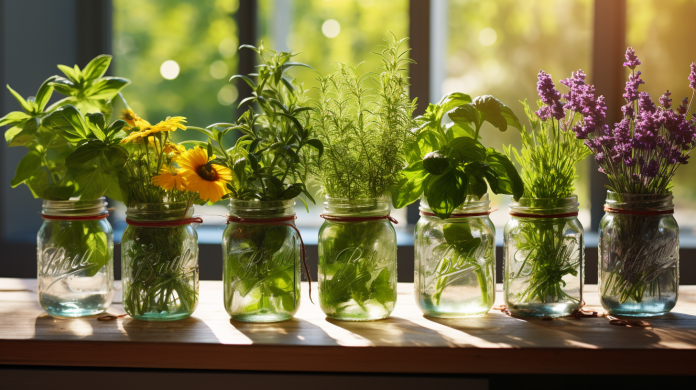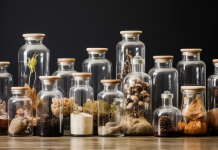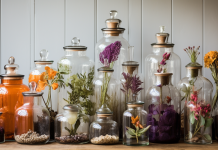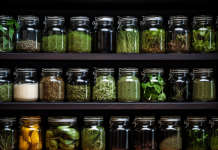In the world of gardening, jar gardening has emerged as a convenient and space-saving option for plant enthusiasts. However, selecting suitable herbs for jar gardening requires careful consideration.
This article aims to provide guidance on factors to consider when choosing herbs for jar gardening, including their suitability for small spaces, sunlight requirements, and low maintenance needs. Additionally, it will highlight herbs that are perfect for culinary uses in jar gardens.
Factors to Consider When Selecting Herbs for Jar Gardening
There are several factors to consider when selecting herbs for jar gardening.
One important aspect is the watering techniques for herbs in jar gardens. Since the space in the jar is limited, it is crucial to choose herbs that have low water requirements. Drought-tolerant herbs such as rosemary, thyme, and lavender are ideal choices as they can thrive in drier conditions and require less frequent watering.
Another factor to consider is the type of soil used in jar gardening. Using organic soil provides numerous benefits for the herbs. Organic soil is rich in nutrients, promotes healthy root growth, and improves water retention. It also helps to maintain a balanced ecosystem within the jar, supporting beneficial microorganisms and reducing the risk of pests and diseases.
Herbs That Thrive in Small Spaces
When choosing herbs for small spaces, it is important to select those that can thrive and flourish in confined environments. Creative container options for jar gardening can help maximize limited space and allow for successful herb cultivation.
Growing herbs indoors in limited spaces offer several benefits, such as easy access to fresh herbs for cooking, the ability to control growing conditions, and the aesthetic appeal of having a mini herb garden indoors. With the right herbs and creative container options, even the smallest of spaces can be transformed into a thriving herb garden.
Sunlight Requirements for Jar Gardening Herbs
Proper sunlight exposure, along with adequate watering and soil conditions, is crucial for the successful growth and development of herbs in jar gardening.
Sunlight provides the energy needed for photosynthesis, which is essential for the production of food and nutrients in plants. When it comes to jar gardening, it is important to choose herbs that have similar sunlight requirements to ensure they thrive in their limited space.
Here are some tips for selecting herbs based on their sunlight needs:
- Full Sun: Herbs like basil, rosemary, and thyme thrive in direct sunlight for at least 6-8 hours a day.
- Partial Sun: Herbs such as mint, chives, and parsley can tolerate some shade and require 4-6 hours of sunlight.
- Indirect Sunlight: Herbs like cilantro and dill prefer indirect sunlight and can grow well in bright, filtered light.
- Shaded Areas: Certain herbs like lemon balm and mint can grow in shaded areas but still need some light to flourish.
- Adjusting Sunlight Exposure: If your herbs are not getting enough or too much sunlight, you can move the jars to different locations or use shades to regulate the amount of light they receive.
By ensuring proper sunlight exposure, you can provide the ideal growing conditions for your jar gardening herbs, promoting their overall health and productivity.
Low Maintenance Herbs for Jar Gardening
While some herbs require regular care and attention, there are low maintenance options that are perfect for jar gardening. If you're looking for herbs that can withstand periods of neglect and still thrive, consider choosing drought-resistant herbs. These herbs are naturally adapted to arid conditions and require less water compared to other plants.
Examples of drought-resistant herbs suitable for jar gardening include lavender, rosemary, and thyme. Additionally, there are also medicinal herbs that are well-suited for jar gardening and require minimal maintenance. These herbs not only add beauty to your indoor garden but also serve a purpose in promoting health and wellness.
Herbs That Are Perfect for Culinary Uses in Jar Gardens
Some of the herbs that are perfect for culinary uses in jar gardens are basil, parsley, and dill. These herbs not only add flavor to various dishes but also provide a fresh and aromatic touch to your culinary creations.
Here are five other herbs that you can grow in your jar garden to enhance your cooking experience:
- Mint: Perfect for adding a refreshing twist to beverages and desserts.
- Rosemary: Adds a distinct flavor to roasted meats and vegetables.
- Thyme: A versatile herb that pairs well with a variety of dishes, including soups, stews, and roasted vegetables.
- Chives: Delicate onion-like flavor that complements salads, omelets, and creamy sauces.
- Cilantro: A staple in Mexican and Asian cuisines, it adds a fresh and citrusy flavor to salsas, curries, and rice dishes.
Get creative with your jar garden and explore the endless possibilities of incorporating these herbs into your culinary adventures.
Key Takeaways
- Choose herbs with low water requirements, such as rosemary, thyme, and lavender.
- Select herbs that can thrive in limited spaces for successful cultivation.
- Ensure a balanced ecosystem within the jar to reduce the risk of pests and diseases.
- Select drought-resistant herbs that can withstand neglect and require less water.
Conclusion
In conclusion, selecting suitable herbs for jar gardening requires considering factors such as space availability, sunlight requirements, and maintenance needs.
Herbs that thrive in small spaces and can be used for culinary purposes are ideal choices for jar gardens.
By carefully selecting the right herbs, individuals can create a low-maintenance and enjoyable gardening experience in their homes.
Please see our selection of supporting topic articles:
Growing Herbs in Glass Jars
Resources
Excellent Resource from University of California Division of Agriculture
and Natural Resources – Grow Herbs



